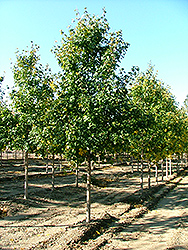St. Gregory Hedge Maple
Acer campestre 'Stgrezam'
Height: 30 feet
Spread: 30 feet
Sunlight:
![]()
![]()
Hardiness Zone: 5
Other Names: Field Maple
Description:
A very adaptable tree with a columnar habit, that is well suited for public urban settings as well as a residential accent; slow growing and excellent as a shade tree in narrow areas
Ornamental Features
St. Gregory Hedge Maple has dark green deciduous foliage on a tree with a columnar habit of growth. The lobed leaves turn an outstanding yellow in the fall.
Landscape Attributes
St. Gregory Hedge Maple is a dense deciduous tree with a narrowly upright and columnar growth habit. Its average texture blends into the landscape, but can be balanced by one or two finer or coarser trees or shrubs for an effective composition.
This is a relatively low maintenance tree, and should only be pruned in summer after the leaves have fully developed, as it may 'bleed' sap if pruned in late winter or early spring. Gardeners should be aware of the following characteristic(s) that may warrant special consideration;
- Invasive
St. Gregory Hedge Maple is recommended for the following landscape applications;
- Accent
- Hedges/Screening
- Windbreaks and Shelterbelts
Planting & Growing
St. Gregory Hedge Maple will grow to be about 30 feet tall at maturity, with a spread of 30 feet. It has a low canopy with a typical clearance of 4 feet from the ground, and should not be planted underneath power lines. It grows at a slow rate, and under ideal conditions can be expected to live for 80 years or more.
This tree does best in full sun to partial shade. It is very adaptable to both dry and moist locations, and should do just fine under average home landscape conditions. It is not particular as to soil type, but has a definite preference for alkaline soils. It is highly tolerant of urban pollution and will even thrive in inner city environments. This is a selected variety of a species not originally from North America.
